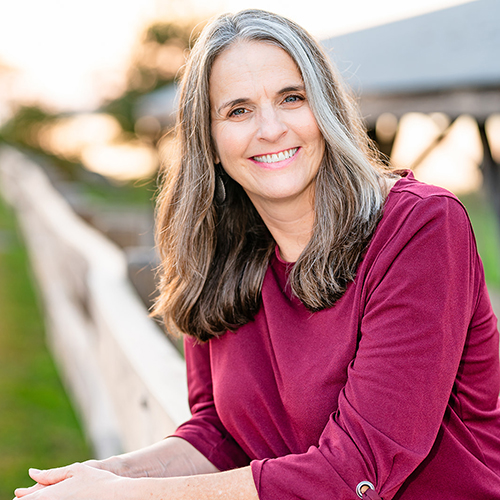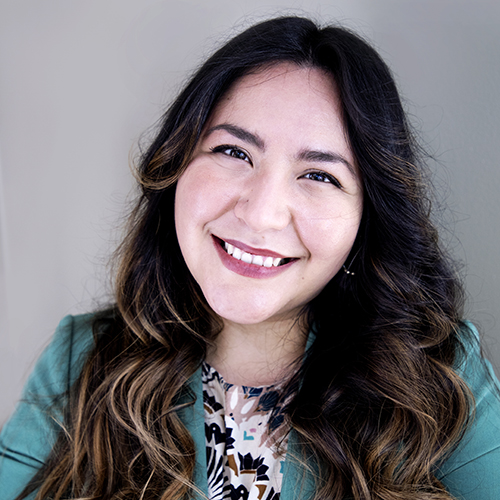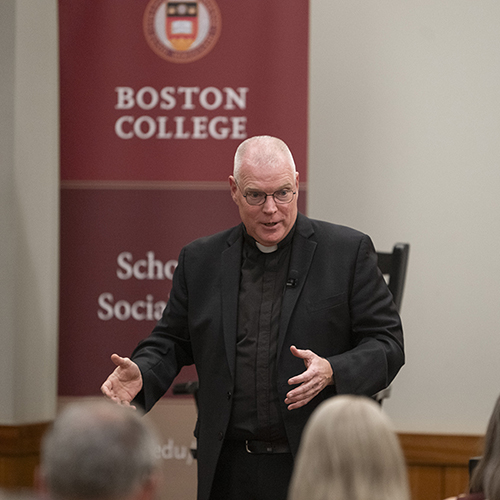
John T. Butler, S.J., Haub Vice President for the Division of Mission and Ministry at BC. Photo by Tony Rinaldo.
John T. Butler, S.J., Haub Vice President for the Division of Mission and Ministry at Boston College, said that social workers and Jesuit priests share the same charge: to make the world a better place for people on the margins of society.
“The Jesuit should show himself ready to reconcile the estranged, compassionately assist and serve those in prisons and hospitals, and perform any other work of charity, according to what will seem expedient for the glory of God and the common good,” Butler said, reading from The Constitutions of the Society of Jesus and Their Complementary Norms on Monday, October 21 in the Yawkey Athletics Center. “That’s what social workers do. They reconcile the estranged, they make love tangible to those on the margins, to those who suffer, to those who have no voice, to those who feel alone.”
Speaking at the Boston College School of Social Work’s annual Equity, Justice, and Inclusion Lecture and Distinguished Alumni Awards Celebration, Fr. Butler told dozens of students, faculty, staff, and alumni that BCSSW has an obligation to prepare social workers in training to “go into the messiness of the world” to tackle global scourges such as hunger while developing policies and practices that foster the common good.
He said that social workers who dedicate their careers to improving the health and well-being of individuals, families, and communities in need are “fulfilling their prophetic roles and staying true” to the mission of the Society of Jesus, which was founded in 1540 by St. Ignatius of Loyola.
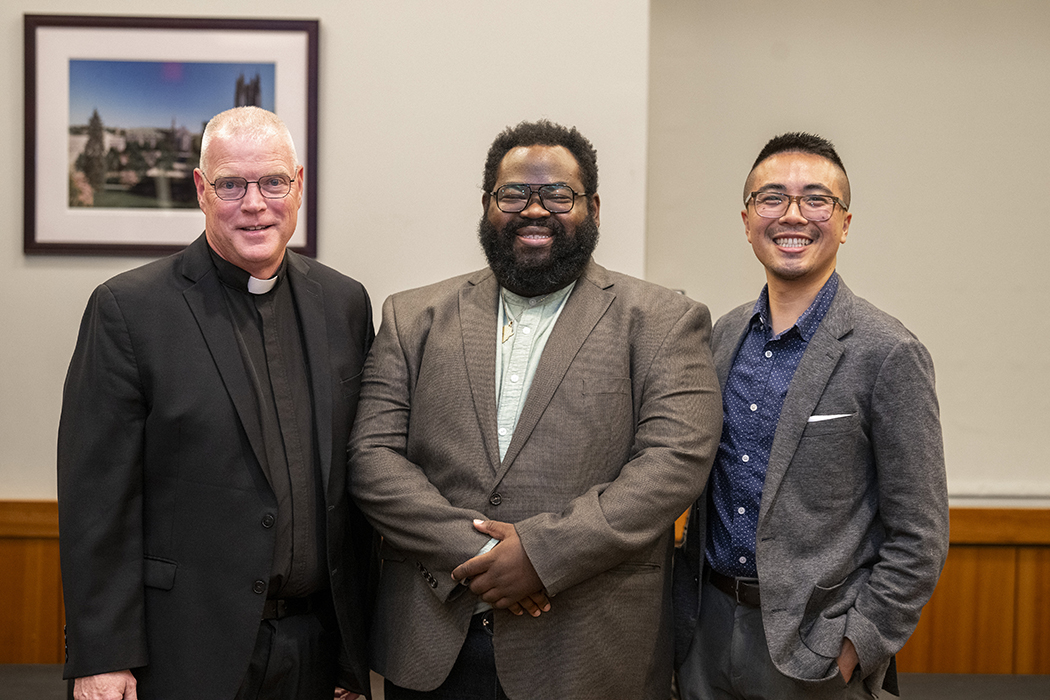
From left to right: Fr. Jack Butler, MSW Program Director Sam Bradley, Jr., and BCSSW alum Taiga Guterres. Photo by Tony Rinaldo.
“I think our professional schools are literally linked to the founding principles of what the Society of Jesus was about,” he said, referring to BCSSW, the Law School, the Connell School of Nursing, and the Clough School of Theology and Ministry.
During his talk, Fr. Butler also extolled the virtues of BC’s long-held commitment to formative education—a guided process pioneered by St. Ignatius of Loyola that helps students find purpose, live fulfilling lives, and understand the world around them.
His focus on formative education dovetailed with the theme of the year for BCSSW’s Equity, Justice, and Inclusion Initiative, “Contemplation in Formation,” which is calling on students to make sense of their experiences and identify their deepest desires through self-reflection, off-campus retreats, and collaboration with communities to solve complex social problems.
Fr. Butler described self-reflection as an essential feature of “what it means to be human” and said that it’s a crucial component of a three-step strategy for social workers looking to serve others—a strategy that he laid out in his speech.
First, he urged social workers to pay close attention to the world around them, “to take time out to notice things.” Then, he advised social workers to reflect on how they feel as a result of what they have seen and consider why that might be.
“Why did I get excited when I saw a tree? Why did I feel hopeful when I heard some music? And you start to go into yourself and you start to reflect on where that came from,” he said. “What in your history can you connect to beauty or pain or suffering? Or where did you feel marginalized? Or where were you pushed away? Or where were you hurt? Or where did you celebrate love? Or where did you feel accepted?”
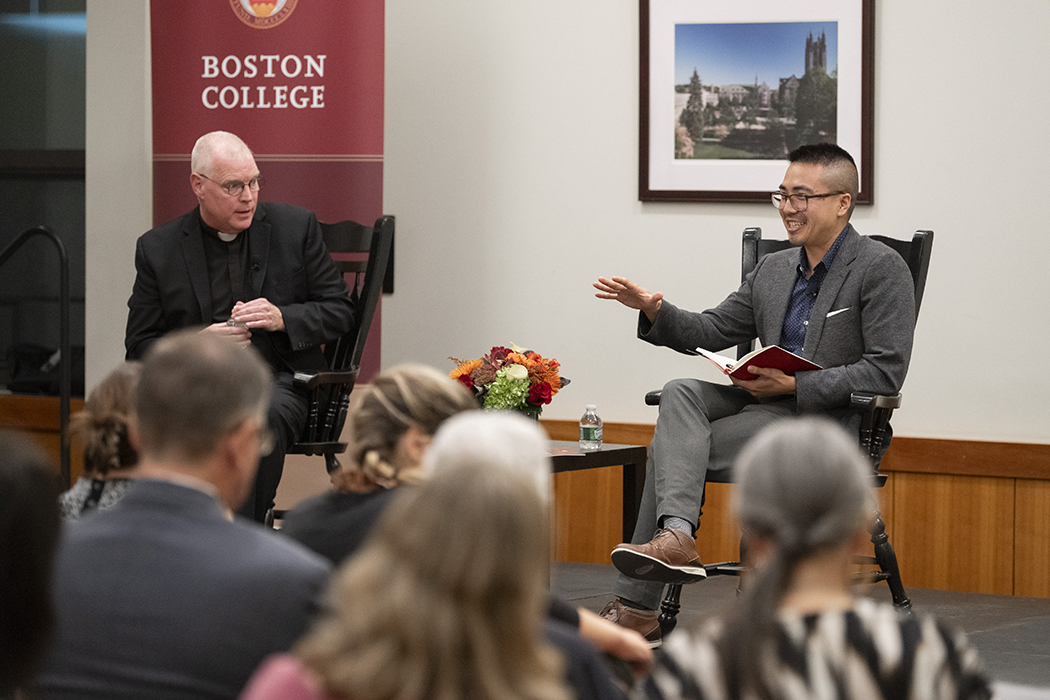
BCSSW alum Taiga Guterres faciliated a Q&A with Fr. Butler. Photo by Tony Rinaldo.
Finally, Fr. Butler recommended social workers act out of love to remedy the problems that they’ve witnessed—problems that they may have faced in their own lives.
“I dare say for many of you, that’s why you’re social workers,” he said. “You were attentive to something and it either resonated in your life or it was so disjunctive to your life that you said ‘this isn’t right.’ And then you were compelled to do something about it—to reconcile the estranged, to heal the hurting, to bring about some peace.”
There were questions. One audience member, a scientist who works in the pharmaceutical industry, asked Fr. Butler how corporations can create support systems for employees that provide the same level of guidance that universities such as BC offer students.
“I think there’s more and more things happening in the world today. We’re not good with health care. We’re very bad with mental health care,” Fr. Butler said. “But there’s more and more assistance programs that companies are implementing to try to deal with that.”
Then he turned to the role that social workers can play in helping clients develop strong social networks that they can rely on in times of hardship no matter where they are in life. “What good social workers do is start to help the client or the patient develop support networks that stay with them throughout life that they can pull on,” he said. “We have the ability, if we help people, to start to do the networking and the structures that come with us.”
Taiga Guterres, M.S.W./M.A.’22, who moderated the Q&A, asked Fr. Butler to reflect on the idea that educators, social workers, and others who help people for a living are on a never-ending journey to support people in need. Will there ever be a time when their work is finished, he wanted to know, when they have arrived at that elusive, final destination of true peace, justice, and equality?
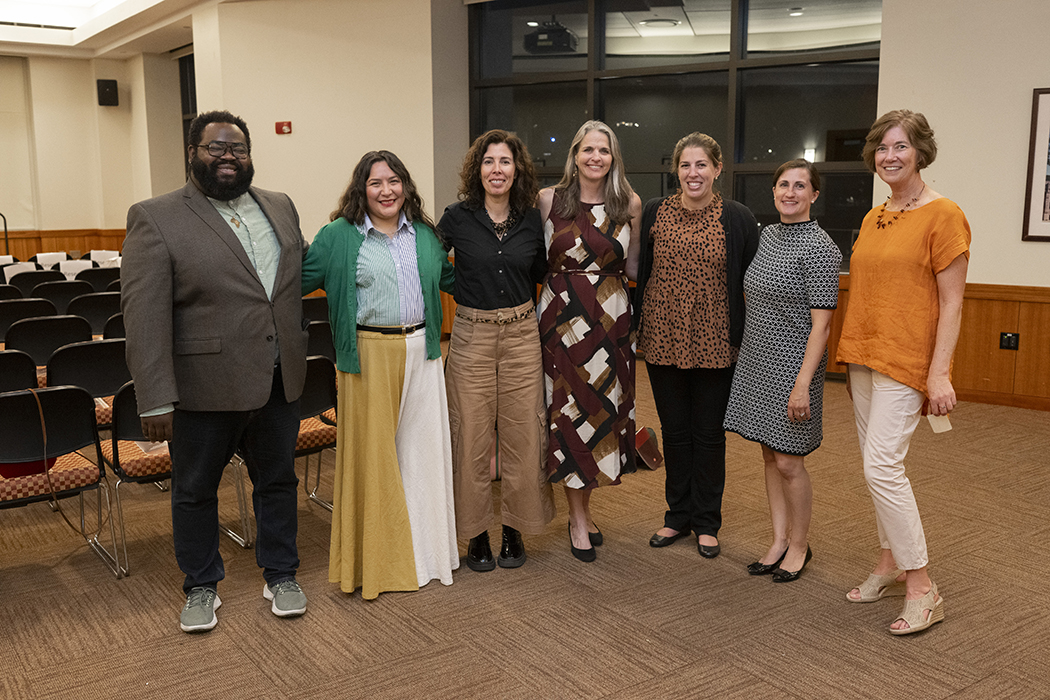
From left to right: Sam Bradley, Jr., Rebecca Camargo, Rocío Calvo, Sheilah Gauch, Victoria Tucker, Alison Mehan, and Cindy Snell. Photo by Tony Rinaldo.
“I don’t think there’s any arrival. I don’t think if you’re a real scholar, I don’t think if you're a real lover of humanity, I don’t think if you’re a real helper, you ever feel ‘I’m there,’” Fr. Butler said. “There’s always more to learn, there’s always more to explore. There’s always more to do. You’re never really going to arrive because there’s always going to be something new and there’s going to be a different horizon, and there’s going to be a new person you meet that’s going to need you.”
After the Q&A, BCSSW honored two alumni for their impressive contributions to the field of social work. The School celebrates two graduates at the event every year, bestowing one award upon an alum who earned an M.S.W. or Ph.D. 10 or more years ago and another award upon an alum who earned an advanced degree between five and 10 years ago.
Sheilah M. Gauch, B.A. ‘96, M.S.W. ‘01, received the Distinguished Alumni Award.
In her acceptance speech, Gauch recalled how her two children were diagnosed with Pediatric Acute-Onset Neuropsychiatric Syndrome and Pediatric Autoimmune Neuropsychiatric Disorder Associated with Streptococcal Infections—conditions that involve brain inflammation and have been linked to obsessive-compulsive disorder, depression, and other behavioral changes.
She then described how she’s used her knowledge of PANS/PANDAS to shape her professional agenda, including her work as the principal and clinical director of Dearborn Academy, a therapeutic day school in Newton, Massachusetts.
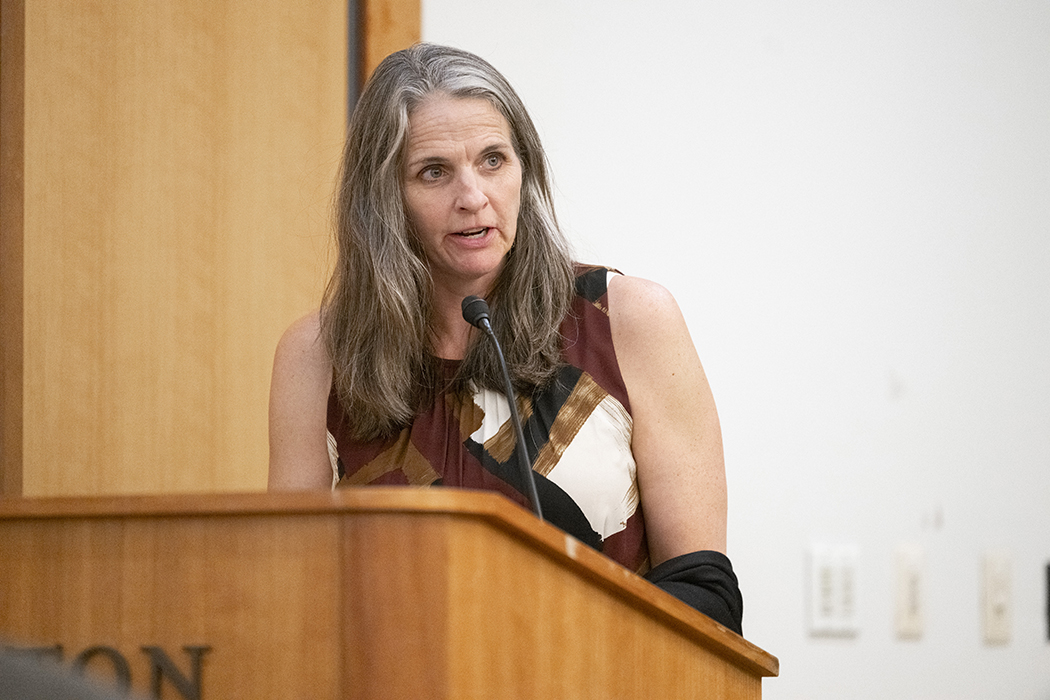
Sheilah Gauch. Photo by Tony Rinaldo.
But Gauch first took attendees back to 2009, to a family trip to Disney World, when her oldest son, then 7, experienced an acute onset of panic, irrational fears, and separation anxiety. He started trying to jump out of moving cars, she said, and required nine weeks of inpatient hospitalization that year. At the same time, her 5-year-old also experienced an acute onset of OCD, separation anxiety, rage, and aggression.
‘When my children became sick, I resolved myself to have them heal. I used every tool I knew as a professional, but they weren’t getting better,” Gauch recalled. “We had a full Department of Mental Health team. We had the police arriving at least once a week. As our youngest was progressively becoming more acute, suicidal, and aggressive, we feared we might lose him to suicide. We were hiding knives, praying every day we would wake up and he would still be with us.”
While her children were in the throes of illness, Gauch met another mom who brought up the possibility that they may have PANS/PANDAS. Gauch had never heard of PANS/PANDAS, but she was desperate, she said, and took her kids to the doctor, who diagnosed both of them with the conditions and put them on a regimen of antibiotics and anti-inflammatories. The medications worked.
“I watched my son be pulled off a cliff of suicidality, the likes of which I have never seen in my entire career as a social worker,” Gauch recalled. “His OCD abated, his aggression calmed. For the first time in six years, I felt we had hope that my children might heal. And if my children had been missed, how many children have been missed? With that hope, I decided maybe I could actually leave my house and see if there were other caregivers like me.”
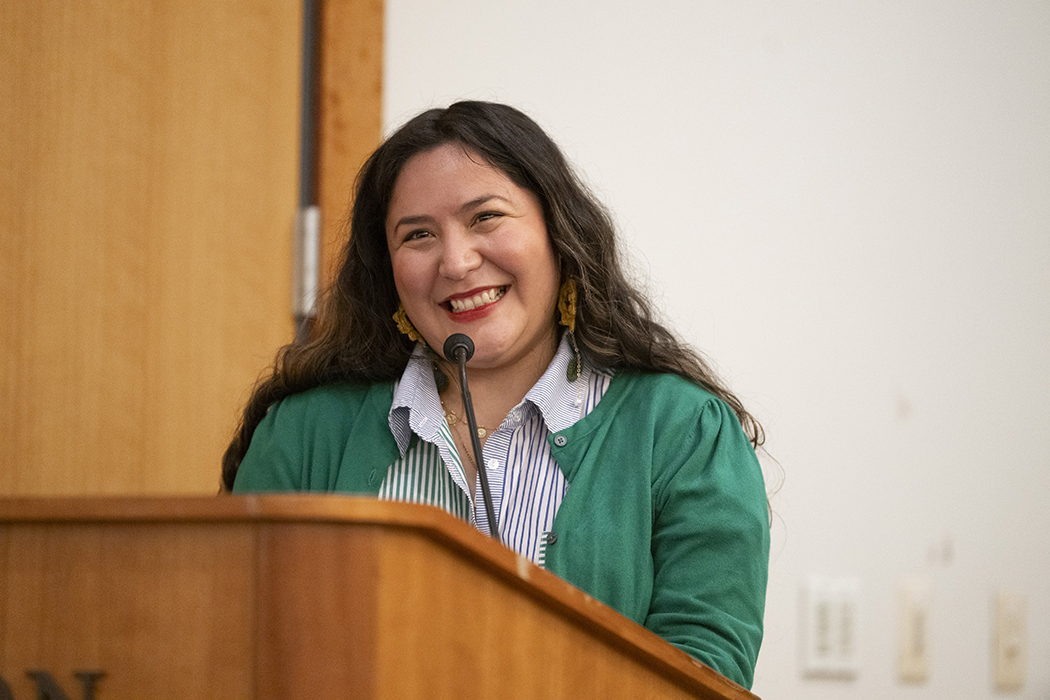
Rebecca Camargo. Photo by Tony Rinaldo.
Over the past several years, Gauch has become a leading advocate in the fight against PANS/PANDAS. She’s championed the passage of legislation that requires healthcare providers to cover the treatment of sick children in Massachusetts with PANS/PANDAS; established a permanent Department of Public Health advisory council for PANS/PANDAS; and co-founded the National Alliance of PANS/PANDAS Action, which is pushing the National Institutes of Health to generate more research for the conditions.
At Dearborn Academy, Gauch is part of a team that, she said, consistently does what’s best for students and caregivers. “Using what I was learning from my own experience, we created robust programming for our caregivers,” she said. “We took out stigmatizing language from our school, and we replaced it with person-first language. You will not hear the words ‘disrespectful,’ ‘lazy,’ ‘provocative,’ ‘oppositional,’ ‘manipulative,’ or ‘defiant.’ And then we went one step further. We developed our diagnostic consult model. We brought in a psychiatric nurse practitioner. And we began to offer deep dives for students who seem treatment resistant.”
What Gauch and her colleagues have found has stunned everyone involved. Students who have attempted to end their lives, who have spent prolonged periods of time hospitalized, who have had medical conditions that have been missed such as PANS/PANDAS, Lyme disease, and acute thyroiditis—they have all begun to heal. They have made friends, set goals for themselves, and enrolled in college.
Her own youngest child, she said, who couldn’t read in eighth grade, received an academic scholarship to Massachusetts Maritime Academy and is thriving as a starter on the football team. Her oldest child is a senior at the University of North Carolina at Chapel Hill and is considering medical school.
“As a social worker, when I learned about PANS/PANDAS, I turned and ran toward the science,” Gauch said. “The science can revolutionize mental health as we know it, but we have to be open to learning new things. This isn’t either medical or mental health. This is both.”
She urged social workers to investigate the link between suicide and inflammation, pointing to the thousands of articles on the topic in the BC Libraries, and she underscored the urgency to address the connection by noting that suicide is the second leading cause of death in people ages 10 to 14 and 20 to 24.
“We are just the group to demand change and lead the way, build bridges among providers, caregivers, and clients, and revolutionize how we talk about and care for those with mental health needs,” she said.
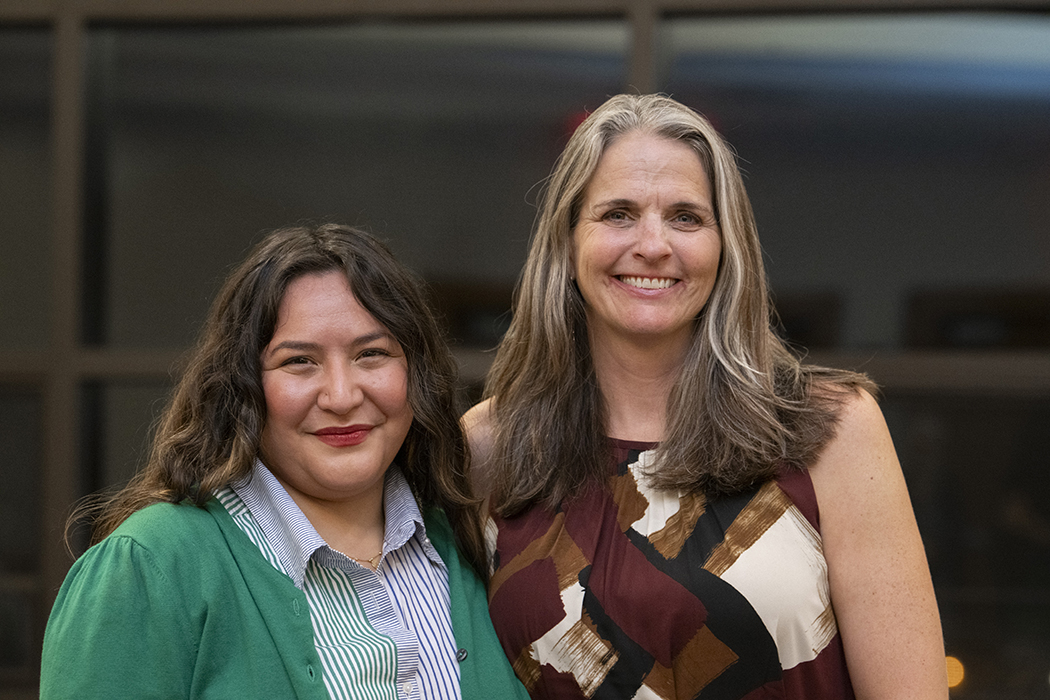
From left to right: Rebecca Camargo and Sheilah Gauch. Photo by Tony Rinaldo.
Rebecca Camargo, M.S.W.’15, received the Distinguished Recent Alumni Award.
She’s dedicated her professional life to reducing homelessness nationwide. One year after graduating from the M.S.W. program, she was hired as the first director of resident services for the Newton, Massachusetts, Housing Authority. Her accomplishments at the city’s largest provider of affordable housing included developing mental health services for low-income residents, creating an annual survey to collect feedback from tenants, and increasing the amount of yearly grant funding to the Resident Services Department from $12,500 to nearly $300,000.
For the past two years, she’s worked as a consultant for Focus Strategies, a firm that provides communities throughout the United States with strategic, data-informed solutions to reduce homelessness.
“Any success that I have as an individual is the product of the strength and nourishment of so many others that have come before me and who make up my community,” said Camargo, who thanked her family in attendance for inspiring her to achieve greatness.
Rocío Calvo, professor and founding director of BCSSW’s Latinx Leadership Initiative, recalled meeting Camargo in one of her classes in 2013. Calvo said that she was particularly impressed by a presentation Camargo made on volunteerism and persuaded her to become part of a then burgeoning cohort-based program that prepares students to work with Latinx communities to create sustainable solutions to complex problems.
“I put one of my smooth moves, and I said, ‘Rebecca Camargo, I want to profile you. Are you Latina? Do you speak Spanish?’ Calvo recalled, drawing laughter from the audience. “And she’s like, ‘What?’ And I said, ‘You are in the LLI.”
Calvo acknowledged Camargo for helping to shape the success of the award-winning program, which marked its 10-year anniversary with a daylong symposium in March, and described her as “the catalyst for what the LLI is today.”
“You showed me the way. I’ve been learning since then. I admire what you do,” Calvo said in her introduction of Camargo. “And I just want to not only congratulate you, but to thank you for showing me where to go.”
Camargo, for her part, said that she is not doing enough on her own to improve the health and well-being of people on the margins of society. But she acknowledged the BCSSW alumni community, of which she is now a member, for its collective efforts to address some of the world’s most pressing social problems.
“I, Rebecca Camargo, am not solely doing enough to tip the scales and to correct the systemic failures that let down our communities every day. But this community, this network of promising and passionate alumni social workers, might be doing enough,” she said. “On my most hopeful days, I think we as a community of alumni are making change collectively—change that is real, that can be felt and seen and measured, and that is moving the needle toward justice. So for that, I’m so proud to be part of this collective.”



